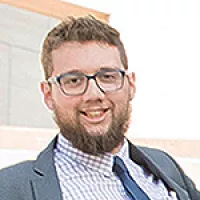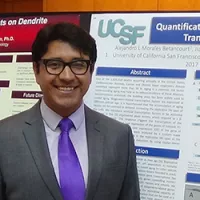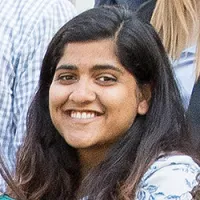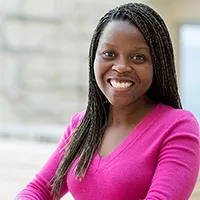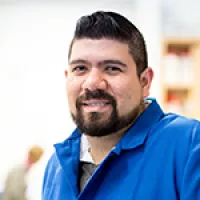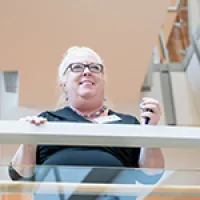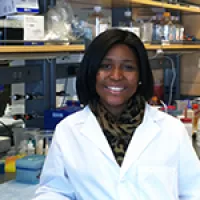The Big Picture
A group of young people relax, eat, socialize, and soak in the sun on the grassy quad at the Mission Bay campus, the site of the majority of UCSF's basic science PhD programs. But these are not graduate students. They are undergraduates enjoying a 4th of July picnic, one of many social events that are part of the UCSF Graduate Division’s Summer Research Training Program (SRTP). Today, the students are fulfilling one requirement of their summer experience: to meet, connect, and form lasting bonds with their fellow program participants.
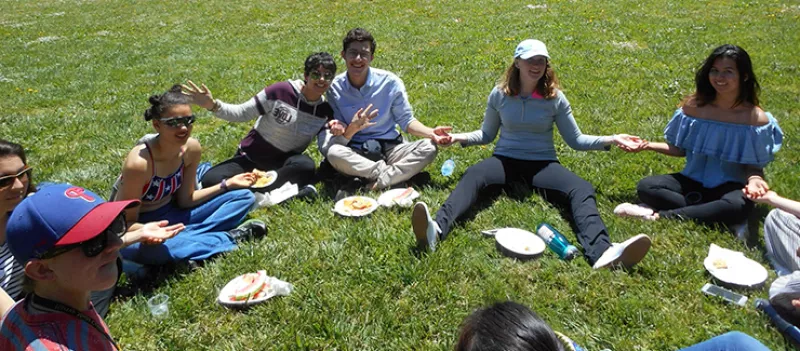
The most crucial goal for students in the 10-week Program, though, is to get a realistic picture of graduate school – to try their hand at doing graduate-level research at one of the world's foremost biomedical research campuses. Outside of the lab, students also gain perspective on larger issues in academia and science, and they explore potential career paths in science through weekly seminars. The Program culminates in a 3-day research symposium, in which each student presents a poster and gives a talk on their summer research project. Their peers, lab members, faculty, and other campus community members provide valuable feedback to the students for future presentations.
The 2017 cohort was a special one — they were the 30th group of undergraduates to experience UCSF's highly successful SRTP program. The 50 students represented 35 colleges and universities in 16 states across the U.S. and Puerto Rico. At UCSF, they worked in the labs of 49 principal investigators. Summer students receive advice and guidance not only from faculty, but also from advanced graduate students and postdocs, who in turn gain valuable mentoring experience.
UCSF’s program is one of hundreds of summer research programs at universities throughout the country, but it is distinguished by the high caliber of the faculty, postdoc, and student mentors involved; by the collaborative nature of the cutting edge research conducted on campus; and of course by the University's strategic location in the Bay Area, an international center for scientific innovation. Professor Carol A. Gross, PhD, SRTP's long-time faculty lead for managing the research success of the summer students, remarked, "Most of our SRTP students go on to obtain PhD and professional degrees, many here at UCSF. I often hear back from former students about how seminal this program was in their career trajectory."
Since 1987, the Program has hosted an average of 50 students annually, over 1,500 students altogether. SRTP represents a key part of the Graduate Division's efforts to recruit promising undergrads from a broader range of backgrounds. Summer cohorts each year have included students who may not have had access to well-equipped labs, robust science programs, or graduate school preparation at their undergraduate institutions — factors that could make them less confident to apply to a top-tier, research-intensive university like UCSF. The numbers show that the Program is an effective recruitment tool. Having completed SRTP, 23 of the 56 participants from the 2016 session applied to UCSF PhD programs. Ten of these applicants were offered admission, and nine accepted.
Individual Voices
The facts and figures tell only a partial story. The personal experiences of the many students who've passed through the SRTP program reveal more dimensions of the impact the Program has had individually and collectively. We asked some students, alumni, and staff to share their thoughts on their pieces of the 30-year story.
The "Class of 2017"
We caught up with three SRTP 2017 participants at the culminating research symposium this past summer. The stories they shared demonstrate that while the science is the focus and the driving interest, human interactions are key in enabling a good research training experience to take place and inspire a student.
Eric Barrientos of Arizona State University, a 2017 SRTP participant and NSF/REU Scholar, was matched with UCSF Assistant Professor Shaeri Mukherjee. His project over ten weeks involved using an intracellular pathogen, Legionella, to learn more about how cells respond to stress due to unfolded proteins during infection. “While everyone at the Mukherjee lab was exceedingly generous with their time and knowledge, my postdoc supervisor, Dr. Elias Cornejo, was particularly inspiring to me. It was very affirming to work with another child of Latin American immigrants who has accomplished so much in research,” said Barrientos. Read more about Eric's SRTP experience.
Alejandro Morales Betancourt, a 2017 SRTP participant and Amgen Scholar from the University of Texas, San Antonio, spent the summer of 2017 doing research into aging, in the lab of UCSF Professor Hao Li. There, said Morales, "Everyone treated me as a scientist, not as a student. Although my lab members knew that my knowledge in the field was limited, they gave me the confidence to develop the research project in a successful manner.” Read more about Alejandro's experience.
Shivani Phadke, a 2017 SRTP participant and Amgen Scholar from Rochester Institute of Technology, worked in the lab of UCSF Assistant Professor Seemay Chou, where she studied a protein involved in a bacterial competition pathway. Phadke said that the SRTP experience “... allowed me to not only immerse myself in research, but to share a living space with 49 incredibly talented future scientists. I have never been surrounded with so many friendly faces, with ambitions and interests similar to my own.” Read more about Shivani's experience.
SRTP Alumni
UCSF graduate students who come to UCSF via SRTP often get involved as mentors or student advisers in the Program later and provide valuable support. In 2017, for example, seven of the eight student advisers were SRTP alumni. Flora Rutaganira, PhD, a 2010 SRTP alumna and recent graduate from UCSF's Chemistry and Chemical Biology program, was an SRTP graduate student adviser for four years.
Dr. Rutaganira said, "Having a program like SRTP gives undergraduates the tools to take in all these emotions of excitement, challenge, and nervousness and put it into a 10-week project, where you often leave with a totally different perspective on science. For me it helped me take skills that I was slowly learning as an undergrad (writing, public speaking, textbook knowledge, time management) and put them together into a project and ultimately really show me what being a graduate student was like... As a mentor to SRTP students, I was also able to appreciate the importance of the 'family-style' environment for the undergrads. Everything can be so new that having a support group that is constant throughout the process is critical. It is amazing and really heartwarming to see so many alumni from the program doing well post-SRTP."
Flora, who also founded the S4D — Scientists for Diversity — group at UCSF, was recently awarded a prestigious Hanna Gray Fellowship from HHMI to support her postdoctoral research at UC Berkeley.
Another SRTP alumni success story is Saul Villeda, PhD (summer 2003), who is now on the Neuroscience faculty at UCSF. "It’s pretty crazy, but I actually worked in the lab of Allan Basbaum who is now my department chair," said Villeda. "In terms of the influence SRTP had on my career – it was absolutely huge. I remember that it was during that time in the summer that I decided I wanted to be a faculty someday and would pursue a PhD. I still remember a talk Arturo Alvarez-Buylla gave us that summer where he spoke about thinking outside of the box as a scientist, and that just resonated with me throughout my graduate education. I gained so much confidence that summer and don’t think I would have ended up as a faculty member at UCSF had I not participated in SRTP."
SRTP Staff
Julia Clark, SRTP coordinator for over a decade now, got stares from grocery shoppers last summer as she piled some 75 ears of corn in her grocery cart for the annual BBQ, and she's done just about everything over the years from organizing the application review process to giving a homesick student a shoulder to cry on.
"Preparing for and running the program each summer is a lot of work, but the payoff is knowing that you’re positively impacting young people’s lives. Some of these students come from very humble backgrounds; some are the first generation to go to college. To help them connect the dots and succeed in higher education is incredibly rewarding. A high number of our SRTP participants go on to graduate school. If they come here to UCSF, I have the pleasure of seeing them progress through our programs. But even if not, I will often run into SRTP alumni when we’re recruiting at the SACNAS and ABRCMS conferences and it’s always satisfying to hear where they are and to see that they are being successful,” said Clark.
D'Anne Duncan, PhD joined the Graduate Division last August as director of diversity and outreach. As a newcomer to SRTP, she looks forward to continuing the Program’s vision and seeing how it will grow to allow more students access to an undergraduate research experience at UCSF. “There are thousands of stellar undergraduates interested in becoming PhD-trained scientists and contributing to the diversity of the biomedical research workforce, but who may not have the opportunity to see what a scientist does or to perform bench-research at their home institutions; therefore, it’s important for UCSF’s program to continue to equip the next generation of scientists with unique research experiences.”
Moreover, Duncan's training as a scientist has given her personal insight into the value of a program like SRTP. “As a former summer research program participant at a top-tier research institution, I learned first-hand the impact these programs have on building an undergraduate’s PhD skill set and confidence by increasing the ability to perform research, enhancing oral and written communication skills, learning about graduate school and creating a network with fellow scientists — all of which are important aspects of earning a PhD.”
****
It's too soon to report how many of the 2017 cohort will end up as graduate students at UCSF, but as we reflect on 30 years of SRTP and accept applications in anticipation of the 31st, we know that 20 of these students presented their research at the national SACNAS conference in October, where four won awards. And at the ABRCMS Conference a few weeks later, 24 presented and 11 won awards. Already, the research experience and confidence they gained over the summer at UCSF were paying off.
Apply to the 2018 Summer Research Training Program by the February 1 deadline.
The Graduate Division thanks the following funding sources for their generous support of the Summer Research Training Program at UCSF:
Amgen Foundation • Genentech Foundation • National Science Foundation • UC LEADS • Biophysics Graduate Program • Pharmaceutical Sciences and Pharmacogenomics Graduate Program • Neuroscience Graduate Program • Biomedical Informatics Graduate Program

